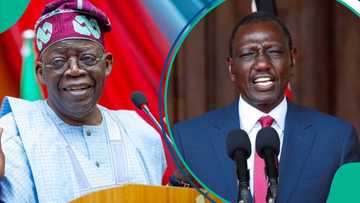UK to Allow Zero Duties on 3,500 Nigerian Goods Under New Trade Agreement
- The third phase of the UK-Nigeria Standards Partnership Programme was unveiled to boost Nigeria's export competitiveness and market access
- The programme facilitates zero-tariff imports for over 3,500 Nigerian products under the UK’s Developing Countries Trading Scheme, benefiting regional producers
- Through collaboration with the UK Foreign, Commonwealth & Development Office, the programme aims to strengthen Nigeria's national quality infrastructure
Legit.ng journalist Zainab Iwayemi has 5-year-experience covering the Economy, Technology, and Capital Market.
The third phase of the UK-Nigeria Standards Partnership Programme, a technical cooperation agreement aimed at removing trade barriers, improving product competitiveness, and expanding market access—particularly for Nigerian exports into the UK—was publicly unveiled on Thursday, giving Nigeria's export aspirations a significant boost.

Source: Getty Images
In collaboration with the UK Foreign, Commonwealth & Development Office, the program brought together government stakeholders and Nigerian businesses to promote global trade and accelerate market expansion.
A representative at the event disclosed that at least 3,500 Nigerian goods are eligible for zero tariff import duties to the UK through the UK's Developing Countries Trading Scheme, which is revolutionary for regional producers, agribusinesses, and SMEs looking to enter high-end foreign markets.
The Standards Partnership is hosting the event with the goals of strengthening the institutional capacity of the Nigerian National Accreditation and the Standards Organization of Nigeria, facilitating the implementation of Nigeria's National Quality Policy, and expanding technical cooperation with the National Quality Council.
It strengthens the two nations' increasing trade ties at a time when more British companies are interested in investing in Nigeria and other African nations due to the continent's wealth of mineral resources.
Officially established in 2023, the program uses international standards to promote sustainable and equitable growth and commerce in 11 countries and island regions, including Nigeria.
Speaking in his welcome address, the Chairman and Chief Executive of the NQC, Ostia Aboloma, said the partnership is a turning point for Nigeria’s trade ecosystem, offering a strategic pathway to elevate the country’s export readiness.
He said that by making import and export procedures easier, this would increase trade between the two nations and make a substantial contribution to social welfare, job creation, and economic progress.

Read also
Apply now: FG launches Green Money Project to empower youths in agribusiness with skills, loans
He said, “The Standards Partnership Programme is being undertaken between the Foreign and Commonwealth Development Office on behalf of the UK Government and the National Quality Council on behalf of Nigeria and is being implemented by the British Standards Institution.
“The Programme is targeted at supporting Nigeria through the NQC and the Arrowhead in the implementation of contemporary national quality policy, thus strengthening the national quality infrastructure pillars, namely standards, conformity assessment, metrology and accreditation towards greater efficiency and sustainability.
“This, without doubt, will enhance trading activities between the two countries via seamless import and export, as well as contribute immensely to economic development, job creation and social welfare.”
The most noteworthy accomplishment of the program, according to Simeon Umukoro, the Trade Market Access Lead for the UK High Commission, has been the institutionalization of metrology, or the science of measurement, as an essential instrument for trade competitiveness.

Source: Getty Images
UK declares zero tariffs on over 3,000 goods from Nigeria
Legit.ng reported that Nigerian exporters may receive relief as the United Kingdom has declared duty-free access for 99% of goods coming from Nigeria and 36 other countries.
This was done under the Developing Countries Trading Scheme (DCTS) and is part of the UK Government’s plan to boost trade with developing countries and support their industrial growth.
The British High Commission in Nigeria shared the update on its X (formerly Twitter) handle on Thursday.
Source: Legit.ng




